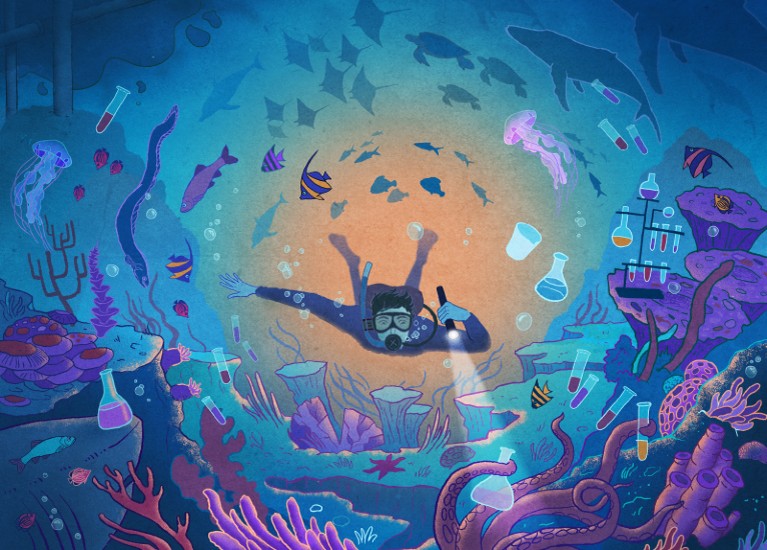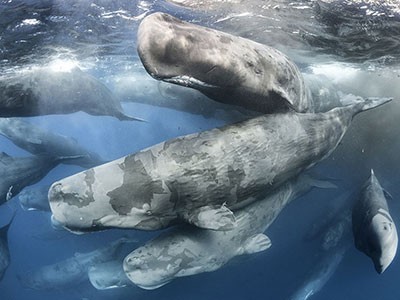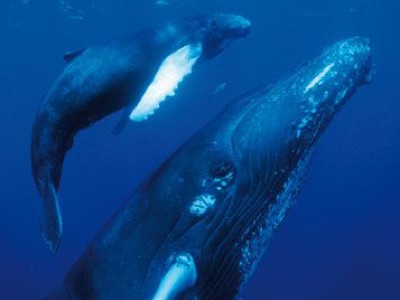
Illustration by Antoine Dore
Neptune’s Laboratory: Fantasy, Fear, and Science at Sea Antony Adler Harvard University Press (2019)
Reef Life: An underwater memoir Callum Roberts Profile (2019)
On a calm day, the ocean can resemble a vast mirror. Peering over the side of a boat, we might see ourselves reflected; what lies beneath is hidden.
In Neptune’s Laboratory, environmental historian Antony Adler takes this observation as a leitmotif. The ocean, he writes, is “an ideal screen for human projections of fear and hope”. In his entertaining, readable history of marine science, the author shows how humanity’s fundamental ignorance about the sea has often fed fantastical ideas of it as saviour, battlefield, playground, storehouse, angry beast or hapless victim. Throughout, he reminds us, we have struggled to see Earth’s oceanic reaches for what they truly are: the face of our changing planet.
That recognition of a rapidly, irreversibly altering ocean permeates every page of Callum Roberts’s scientific memoir, Reef Life. He takes a deep dive into his own four-decade career as a marine ecologist, chronicling the splendour, complexity and vulnerability of coral reefs. Both books left me with a sense of urgency about the ocean’s perilous state, but also with renewed hope that we have reached a turning point in our collective relationship with it.
Sea changes: whales, krill and human exploitation
Through his eventful tale, Adler recounts how scientific inquiry into the ocean began in earnest less than 200 years ago, and how the findings of myriad individuals gradually coalesced into an interdisciplinary field: oceanography. Adler discusses many colourful personalities. For instance, the “Prince of Ocean Science” — Albert I of Monaco — funded the early expansion of oceanography in Europe in the late nineteenth and early twentieth centuries. And French under-sea explorer Jacques Cousteau popularized the ocean through film and television.
Two opposing trends feature in Neptune’s Laboratory. On the one hand, marine scientists such as Albert I have often worked hard to forge international collaborations, recognizing the ocean as a common good without clear boundaries, too large for any one nation to grasp. Others have tended towards nationalism and parochialism, seeking to carve up the ocean for political, economic or military gain. One such was US mechanical engineer Carroll Livingston Riker. In 1912, he unsuccessfully lobbied the US Congress to spend US$190 million on a 320-kilometre jetty, intended to redirect the Labrador Current and Gulf Stream, warming the Arctic to produce ice-free harbours.
A richer context
Personally, I found Adler’s study enlightening. I have rarely seen the history of oceanography taught in any comprehensive way in marine-science classes, either ones I have taken or those I have given. Reading the book, I came to see my own journey as a marine scientist in a much richer context, tightly interwoven with the personalities, philosophies and storylines that dominate the field’s history.
Of particular resonance, for example, is the transformation in our understanding of oceanic limits over the past 150 years. All too recently seen as an inexhaustible, boundless resource — bolted to the hubristic sense that the ‘seven seas’ could be controlled and conquered — Earth’s ocean ecosystems are now being recognized as fragile and in decline. More than 90% of fish stocks are fully or overexploited, and climate change is compromising the ocean’s oxygen supply and productivity. Adler quotes oceanographer Sylvia Earle: “nothing else will matter if we fail to protect the ocean. Our fate and the ocean’s are one.”
That final narrative and call to action largely dominates Roberts’s Reef Life. This is a deeply personal journey of a marine scientist and conservationist whose working life takes place in the oceans of the Anthropocene — the geological epoch proposed to mark humanity’s dominant impact on planet Earth. Throughout his travels, from the Red Sea and the Gulf to remote atolls in the Pacific, Roberts witnesses the slow disintegration of coral reefs from the combined impacts of land-based pollution, habitat destruction, overfishing and ocean warming.
Casting coral reefs as a canary in the coal mine, Roberts warns of the transformative effects of climate change and other human stressors on oceans. Part odyssey, part ‘Reef Ecology 101’, Robert’s witty and vivid descriptions of the underwater world are meshed with the most up-to-date findings, which suggest that “reefs cannot be climate-proofed and they can’t hide from climate change”. Without drastic emissions reductions, we are indeed facing a world without coral.
Battered reefs
Some of his imagery is haunting. He compares the battered and bleached reefs he has witnessed through his career to ailing parents gradually robbed “of mobility, independence and even dignity”. I can relate to Roberts’s painful transition from bright-eyed student fascinated by marine biodiversity to chronicler of decline and advocate for a saner relationship with the sea. Many in our field have watched what we love disappear before our eyes, but few have recounted it in such a public way.
Both books reveal geographical limitations. Neptune’s Laboratory is almost exclusively set in Britain, France and the United States. Yet Adler points out that Russia’s marine-science history is understudied and underappreciated, partly because much of it happened under a veil of secrecy during the cold war. Likewise, members of non-European maritime cultures including Polynesians and Inuit people have long built a deep understanding of the ocean, and framed their relationship to it in different, and possibly more holistic ways, but these are not mentioned here.
And in Reef Life, Roberts’s global travels are viewed very much through his own cultural lens. There is little perspective on the lives and views of the local people who are most affected by the changes he chronicles.
Yet these books both offer a valuable reminder that we are at a crossroads in our collective relationship to world oceans. Humanity now has an unprecedented awareness of what the ocean does for us, such as regulating Earth’s climate though heat absorption and carbon sequestration. At the same time, we increasingly understand how human impact is disrupting ocean systems and threatening the abundance of ocean life. With that understanding comes the opportunity to allow marine ecosystems to recover, as detailed, for example, in the 14th United Nations Sustainable Development Goal, ‘Life Below Water’.
I wondered, after reading Neptune’s Laboratory and Reef Life, whether we are on the cusp of re-imagining the ocean once more when we dive through that mirroring surface to comprehend its depths. As marine scientists Jane Lubchenco and Steven Gaines (Science 364, 911–912; 2019) have put it: “The ocean is not too big to fail, nor is it too big to fix. It is too big to ignore.”



 Sea changes: whales, krill and human exploitation
Sea changes: whales, krill and human exploitation
 Harpoons and heartstrings
Harpoons and heartstrings
 Q&A: Sylvia Earle on protecting our seas
Q&A: Sylvia Earle on protecting our seas







